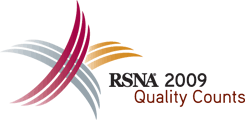
Abstract Archives of the RSNA, 2009
SSQ07-09
The in Vivo Reproducibility of Liver Fat Measurement Using 1H MR Spectroscopy
Scientific Papers
Presented on December 3, 2009
Presented as part of SSQ07: ISP: Gastrointestinal (Hepatic Steatosis)
 Research and Education Foundation Support
Research and Education Foundation Support
Michael Simca Middleton PhD, MD, Presenter: Research Consultant, Siemens AG, Erlangen, Germany
Research Consultant, Confirma, Inc, Bellevue, WA
Grant, General Electric Company
Stockholder, General Electric Company
Grant, Bayer AG, Montville, NJ
Gavin Hamilton PhD, Abstract Co-Author: Research Funded, General Electric Company
Takeshi Yokoo MD, Abstract Co-Author: Nothing to Disclose
Masoud Shiehmorteza MD, Abstract Co-Author: Nothing to Disclose
Claude B. Sirlin MD, Abstract Co-Author: Research grant, Bayer AG, West Haven, CT
Research grant, General Electric Company, Fairfield, CT
Research grant, Bracco Group
Contract, Isis Pharmaceuticals, Inc
Contract, Wyeth
Speaker Bureau, Bayer AG
Consultant, Bayer AG
To show that collecting five single-average liver MR spectra in one breath-hold gives highly reproducible T2-corrected peak areas
Liver 1H MR spectra were collected at 3T on a GE Signa scanner from 36 subjects with known or suspected fatty liver (IRB approved). STEAM spectra were acquired with TR 3500 ms and voxel size 20 x 20 x 20 mm. Five single-average spectra (at TEs of 10, 15, 20, 25 and 30 ms) plus a pre-acquisition excitation were obtained in a single 21 sec breath-hold. This measurement protocol was repeated 3 times, without changing shim, to examine reproducibility of measurement. The spectra were quantified in the time domain, using the AMARES algorithm (1) included in MRUI (2) and the T2-corrected peak area of the water and fat (0.5-3 ppm) peaks were calculated. The hepatic lipid values were expressed as a fraction of the 0.5-3 ppm peak area to the total peak area (water and fat).
References
1. Vanhamme L, van den Boogaart A, Van Huffel S. J Magn Res 129:35-43, 1997. 2. Naressi A, Couturier C, Devos JM, Janssen M, Mangeat C, de Beer R, Graveron-Demilly D. MAGMA 12: 168-176, 2001
The intraclass correlation coefficient for the 3 measurements on the 36 subjects was 0.998. Figure 1 compares the standard deviation of fat fraction of the three measurements with the mean fat fraction for all the subjects. In all subjects the standard deviation was less than 0.01, and the value appeared independent of fat fraction. This suggests that the variability in this method is independent of fat fraction.
We have shown that collecting 5 single average spectra in one breath-hold gives T2-corrected peak areas that are highly reproducible.
Three liver fat fraction measurements in 36 subjects by 3T MR Spectroscopy collecting five single-average MR spectra at multiple TEs in a single breath-hold was highly reproducible.
Middleton, M,
Hamilton, G,
Yokoo, T,
Shiehmorteza, M,
Sirlin, C,
The in Vivo Reproducibility of Liver Fat Measurement Using 1H MR Spectroscopy. Radiological Society of North America 2009 Scientific Assembly and Annual Meeting, November 29 - December 4, 2009 ,Chicago IL.
http://archive.rsna.org/2009/8016835.html


 Research and Education Foundation Support
Research and Education Foundation Support